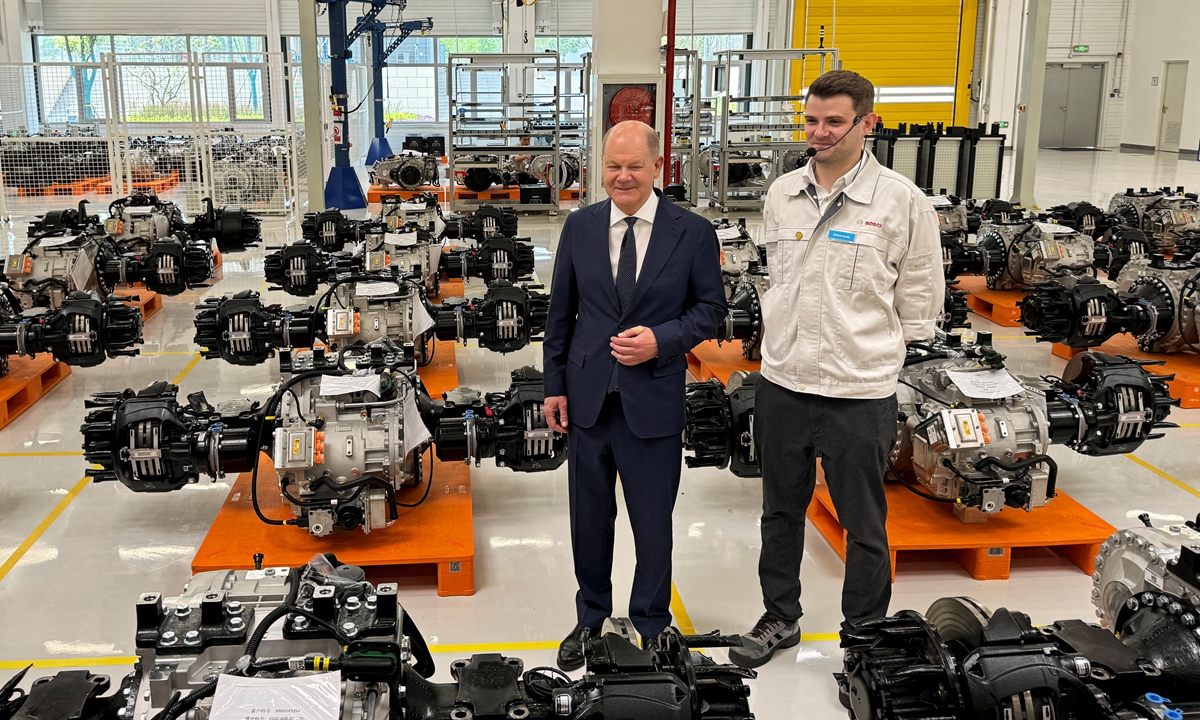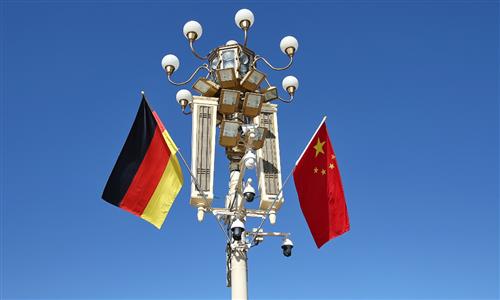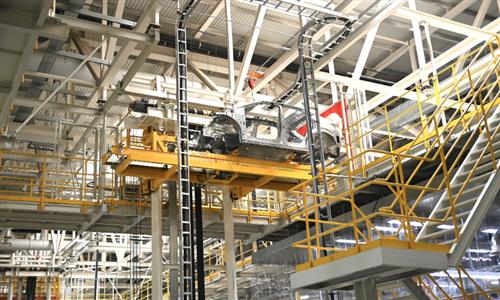China, Germany expected to strengthen green cooperation; 'De-risking' means missing out on opportunities in China
Scholz's visit sends 'strong signal' that de-risking means missing out on opportunities in China: experts

German Chancellor Olaf Scholz (left) visits a Bosch factory for hydrogen drives in Chongqing, China on April 14, 2024. Photo: IC
After exploring Southwest China's industrial city Chongqing, German Chancellor Olaf Scholz on Monday arrived in Shanghai, an important city that has a large amount of accumulated German investment, and where he said that Europe is open to Chinese cars.
Scholz's high-profile visit to three Chinese cities in one of his longest bilateral visits since taking office sends a strong signal of the restoration of China-Germany relations, Chinese observers said, noting that Scholz's intensive visits to German firms in the areas of renewable energy and materials indicate that the two sides may strengthen cooperation in green energy.
On Monday, German materials manufacturer Covestro welcomed Scholz at the company's Asia-Pacific Innovation Center in Shanghai, where the company develops sustainable products for dynamic markets such as renewable energy and consumer electronics.
"Our decades-long presence in China epitomizes the spirit of Sino-German collaboration, which has been strongly beneficial for both sides," Covestro CEO Markus Steilemann was quoted as saying in a statement sent to the Global Times on Monday.
"Scholz's itinerary in China indicates that green energy cooperation may be one of the most important focuses for the chancellor's visit to China, given the energy crisis in Europe over the past two years," Yang Chengyu, an associate research fellow at the Institute of European Studies of the Chinese Academy of Social Sciences, told the Global Times on Monday.
Germany is accelerating its green transition, while China has advantages in production capacity and costs. Thus, the two sides can expand pragmatic cooperation in the emerging field, Yang said.
Accompanied by a high-profile corporate delegation composed of executives from German companies including Siemens, Mercedes and BMW, Scholz also visited Bosch Hydrogen Powertrain Systems (Chongqing) Co, a Sino-German joint venture that develops, assembles and sells fuel cell systems in Chongqing, the Xinhua News Agency reported.
Coming at the 10th anniversary of the establishment of the China-Germany comprehensive strategic partnership, Scholz's ongoing visit to China is one of his longest bilateral visits since taking office in 2021, according to Foreign Policy. On Tuesday, Chinese leaders are set to meet Scholz in Beijing, where he will wrap up his three-day visit.
Since Scholz's first visit to China as the Federal Chancellor, China and Germany have achieved many consensuses, with multilateral dialogue making a rapid recovery and cooperation projects in progress.
"Scholz's second official visit to China since taking office shows that there remains a need for Germany to maintain and deepen economic and trade cooperation with China, although the German government has emphasized 'de-risking' in its view on China-Germany and China-EU relations," Ding Chun, director of the Center for European Studies at Fudan University, told the Global Times on Monday.
Communicating on economic and trade issues, as well as international hot topics, benefits both sides and contributes to the sound development of China-Germany and China-EU relations, Ding said.
Despite the EU's protectionist measures against Chinese electric vehicles, Scholz said in a speech delivered at Tongji University in Shanghai on Monday that "At some point there will also be Chinese cars in Germany and Europe. The only thing that must always be clear is that competition must be fair," CNN reported.
Economic and trade exchanges still play a pivotal role in win-win China-Germany cooperation. Many large German companies, including automakers, are active in making investment in China and conducting trade with China for their own benefit, and they have expressed opposition to "decoupling" and demanded normal economic exchanges, according to Ding.
"China plays a pivotal role in Mercedes-Benz's global strategy, serving not only as home of our largest market and one of our largest manufacturing sites but also one of our global centers for technological innovation. We will continue to invest in China," Ola Källenius, chairman of the board of Mercedes-Benz Group AG, told the Global Times on Monday.
Maximilian Foerst, president of German optical giant ZEISS Greater China, told the Global Times on Monday, "The Chinese market has been not only one of our most important markets, but also a key driver of our global growth in recent years. We are confident about the continued potential, not only as a market and a manufacturing hub, but also as an innovation hub."
Over the past five decades, China-Germany bilateral economic and trade cooperation posted healthy and stable development, with China being Germany's biggest trading partner for the eighth straight year in 2023 and Germany being China's biggest trading partner in Europe for the 49th consecutive year, official data showed.
In July 2023, Germany's Federal Foreign Office released its first-ever China strategy that shifted the focus to de-risking, diversification and a reduction of dependencies on China.
However, a report from the German Economic Institute showed that total direct investment by German companies in China reached a record high of 11.9 billion euros ($12.7 billion) in 2023, up 4.3 percent year-on-year, underscoring the resilience of bilateral economic and trade cooperation.
In spite of the EU's protectionist moves, EU members themselves are inclined to carry out dialogue and cooperation with China. With Germany being the largest economy in the EU, the positive signal sent by Scholz's visit will have a demonstration effect on other European countries to strengthen cooperation with China, Yang said, noting that "de-risking" will risk losing opportunities from the huge China market.




